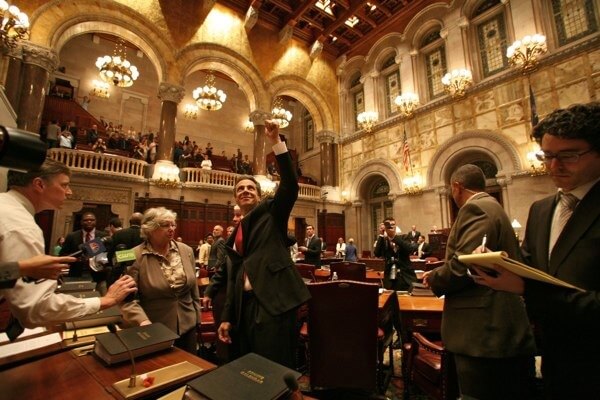By Naeisha Rose
State lawmakers agreed to extend Mayor Bill de Blasio’s control over the city’s schools for two years Thursday during an extraordinary session in Albany that spilled over into a second day as other issues were negotiated.
The Assembly came to a vote in favor of a two-year extension for mayoral control into the wee hours of the night after the Senate had adjourned.
Gov. Andrew Cuomo had set up the one-day session so that legislators could reach an agreement to entrust the city’s public schools to de Blasio before his authority over the education system expired July 1.
The talks were initially stalled because many state Senate leaders “not from New York City” decided to expand “their wish list” and use the special meeting to discuss other issues “like flooding at Lake Ontario, property taxes and pensions for firefighters,” Cuomo told a news conference Thursday afternoon.
Mayoral control was lumped together with other measures in an omnibus bill in what Cuomo called a “global resolution” that was approved by both houses.
Cuomo backed the measures that were included in the omibus bill.
“It was not the session we premeditated, but it was a lot of good work done in a short period of time,” Cuomo said.
After the Legislature’s regular session ended last week, the governor said mayoral control “was dead before the bell rang,” because the GOP stronghold in the state Senate and the Democratic bastion in the Assembly refused to compromise on the cap on charters schools in New York City.
As the clock ticked toward midnight in Albany Wednesday night, state Sen. Leroy Comrie (D-St. Albans) expressed frustration at the lack of progress, but is happy that there is now a resolution.
“While I am pleased that we were able to pass an extender for mayoral control that will last two years, I remain incredibly disappointed in how this process unfolded,” Comrie said. “Going forward, it is imperative that we ensure political considerations never trump policy-making, especially when we are dealing with matters to do with our state’s public schoolchildren. This method of lawmaking debases our Legislature, our schools, and our state. Moreover, there are many critical issues like MTA funding and foreclosure relief that should have been addressed during this session but were not. I look forward to a more transparent and productive session next year.”
This was the first time de Blasio was granted two-year control of the city’s public school system.
The GOP, led by the Senate Majority Leader John Flanagan (R-Smithtown), wanted fewer restrictions on charter schools tied with a directive to offer tax credits to private benefactors and corporations that give “scholarships, education funds and home-based instructional materials,” to these institutions, according to his website.
The Assembly had no interest in loosening caps on the number of charter schools in the city and wanted to extend the mayor’s control of the more than 1,600 schools in the five boroughs to two years.
Despite Cuomo being charter school friendly and having a contentious relationship with de Blasio, he went even further than the Dems in the Assembly by offering the mayor a three-year extension over public schools.
After the Senate and the Assembly failed to reach an agreement June 21, Cuomo held a press conference in which he was visibly upset about the lack of détente between the two parties.
“They’ve now put in a corrupt management system,” said Cuomo.
If the Republicans and Democrats had not put politics aside again, the largest school system in America could have gone back to being run by 32 different school districts, which often had “32 sets of priorities,” de Blasio said.
Reach reporter Naeisha Rose by e-mail at nrose



































